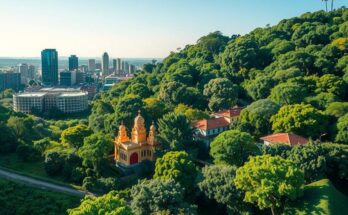The ongoing conflict in Sudan features a struggle between the Sudanese army, led by General Abdel Fattah al-Burhan, and the paramilitary RSF, commanded by General Mohamed Hamdan Dagalo. Following their roles in previous regime changes, both factions have engaged in violent confrontations over power, resulting in significant civilian casualties and widespread displacement.
The ongoing conflict in Sudan involves the Sudanese army and the paramilitary Rapid Support Forces (RSF), each vying for power following their initial collaboration in the toppling of President Omar Hassan al-Bashir in 2019 and the subsequent overthrow of a civilian-led government in 2021. Recently, the Sudanese army has expanded its control, notably seizing the Presidential Palace in Khartoum.
The Sudanese armed forces, led by General Abdel Fattah al-Burhan, commenced the conflict with a numerical and tactical advantage, bolstered by their heavy weaponry, including fighter jets. Historically, these forces have been integral to Sudan’s power structure, with Burhan’s military career deeply entwined in this dynamic. Despite initial setbacks, the army has regained some territory, receiving foreign support, including from Egypt, and employing Iranian drones.
The RSF, commanded by General Mohamed Hamdan Dagalo, known as Hemedti, emerged from militia roots and expanded significantly prior to the current conflict. Analysts estimated the RSF’s strength at about 100,000 personnel. Hemedti’s initial foray into violence stemmed from attacks on his commercial operations, and his forces became notorious through their involvement in genocidal campaigns in Darfur, gaining international attention for their brutal tactics.
While the RSF has captured strategic military bases, they have also been accused of committing ethnic-targeted violence, particularly in Darfur, allegations they deny. Hemedti has cultivated favorable relationships, notably with the United Arab Emirates, despite claims of the UAE supplying arms to his faction. As the conflict escalates, both leaders have faced international sanctions due to their roles in the ongoing violence and humanitarian crises.
The fighting has led to significant civilian casualties and displacements, as human rights violations continue on both sides. In 2025, the U.S. imposed sanctions on Burhan and Hemedti, reflecting concerns over their actions that have perpetuated the conflict, exacerbating the plight of the Sudanese population.
The conflict in Sudan continues to unfold as both the Sudanese army and the RSF vie for control, inflicting severe humanitarian consequences. While the Sudanese army has regained some lands, it faces accusations of indiscriminate violence against civilians. The RSF remains a formidable force, linked to a history of brutality in Darfur and supported by international partners. Current dynamics suggest an escalation in violence and challenges for any potential political resolution.
Original Source: www.hindustantimes.com




